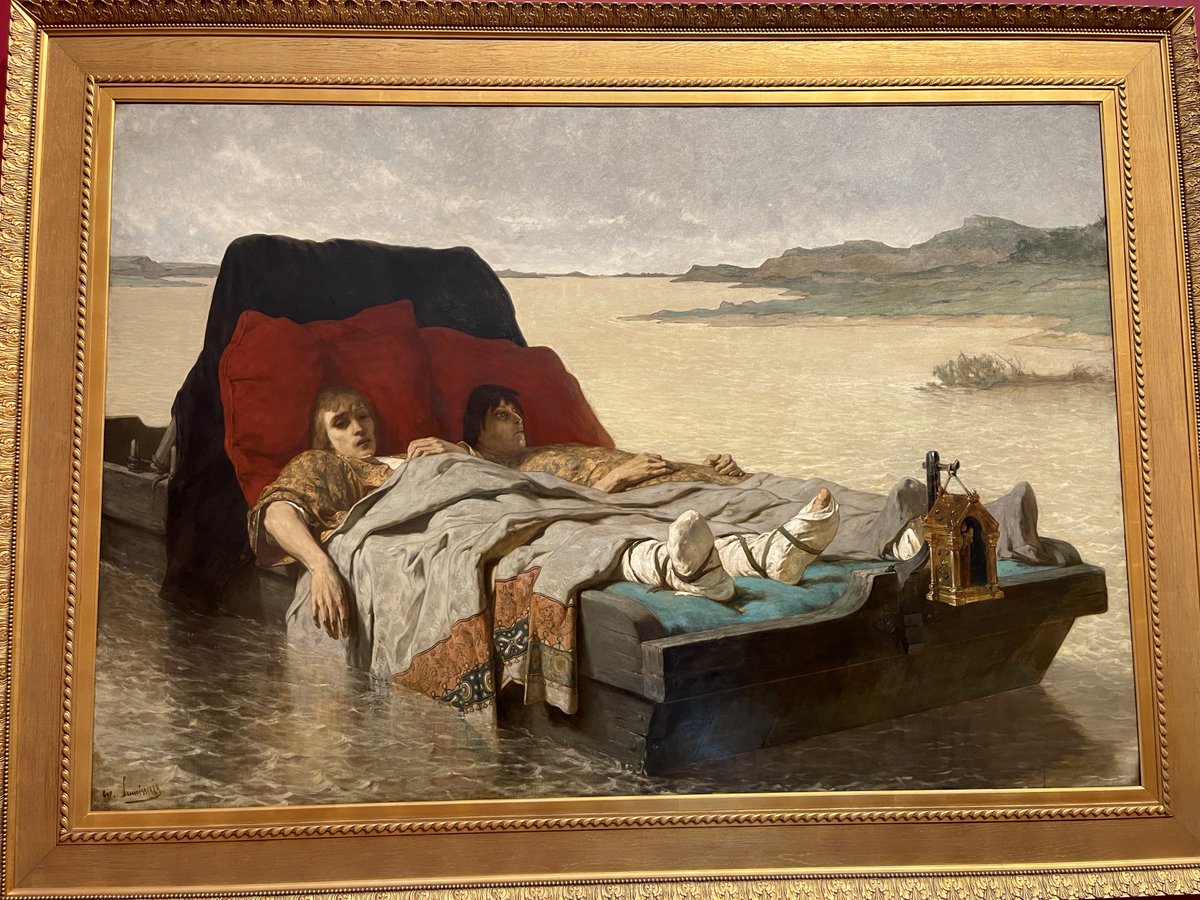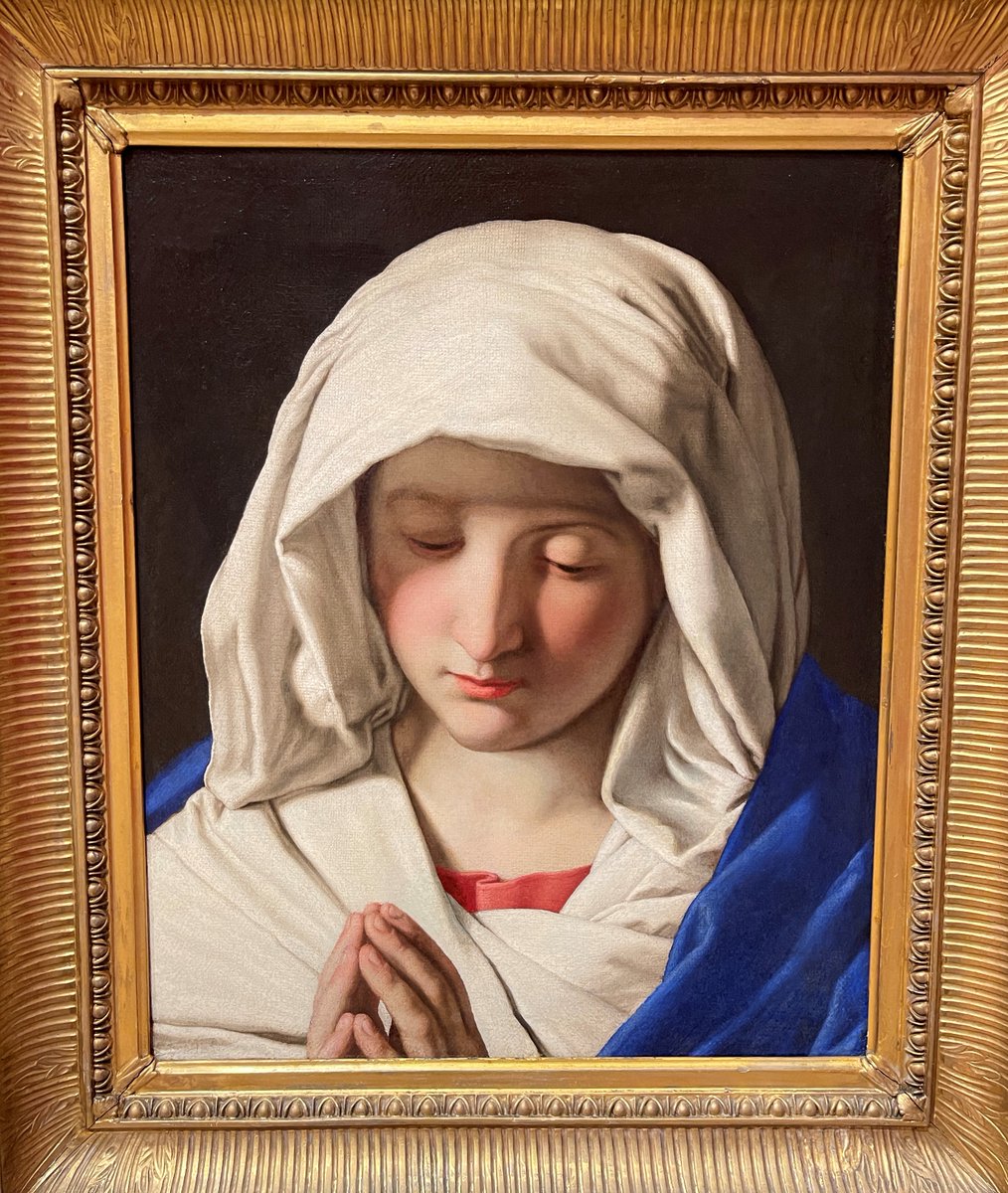Notwithstanding some curator atrocities, I strongly advise anyone in Sydney to patronise @ArtGalleryofNSW as we (and many others) did yesterday. It has a wonderful collection. As few go to the 'modern' collection, it should give way so more of the 18th/19thC art can be displayed.
Eduard Detaille, "Vive l'Empereur" (1891) ... the Imperial French 4th Hussar Regiment during Napoleonic Wars. Detaille's painting pays endless study as it was a depiction of the Hussars' charge as Napoleon himself would have wanted. 

Edouard Detaille was so committed to the detail of his work that a portrait was done of Detaille at work here (by Basil Lemeunier, also 1891) painting the immense canvas - surrounded by the arms and uniforms of the French Hussars. 

Frank William Bourdillon, "On Bideford Sands" (1889)
This seems to be the depiction of either a duel, in which the seconds are trying to make the duelling parties see sense, or the Baroque version of a group chat getting out of control
This seems to be the depiction of either a duel, in which the seconds are trying to make the duelling parties see sense, or the Baroque version of a group chat getting out of control

Evariste Vital Luminais, "The sons of Clovis II" (1880)
A rather ominous painting of Clovis' rebellious sons who were 'hamstrung' by their mother & then cut adrift on the river Seine. Wastrel royal princes needing remedial lessons in familial loyalty clearly nothing new here.
A rather ominous painting of Clovis' rebellious sons who were 'hamstrung' by their mother & then cut adrift on the river Seine. Wastrel royal princes needing remedial lessons in familial loyalty clearly nothing new here.

Alphonse de Neuville, "The defence of Rorke's Drift" (1879)
This painting depicts the famous defence by the Welsh Borderers (and some Sappers) against a ferociously brave Zulu attack & you can spend much time studying its very lifelike depictions of the defenders in the scene
This painting depicts the famous defence by the Welsh Borderers (and some Sappers) against a ferociously brave Zulu attack & you can spend much time studying its very lifelike depictions of the defenders in the scene

Briton Riviere, "Compulsory education" (1887)
If you had a beloved dog as a child (or indeed, as an adult), you will immediately grasp this majestic painting's import and message.
If you had a beloved dog as a child (or indeed, as an adult), you will immediately grasp this majestic painting's import and message.

Marcus Stone, "Stealing The Keys" (1866)
Depicts a civil war scene where a Royalist house is taken over by seditious & drunken Roundheads (who you will note have disfigured the King's portrait) & this loyal & virtuous daughter has come to take the keys to rescue her noble father
Depicts a civil war scene where a Royalist house is taken over by seditious & drunken Roundheads (who you will note have disfigured the King's portrait) & this loyal & virtuous daughter has come to take the keys to rescue her noble father

Edward Poynter, "Visit of the Queen of Sheba to King Solomon (1890)
This enormous and masterful depiction of the Queen of Sheba overwhelmed by Solomon in all his majesty is worthy of awe ... note many things but that Solomon leaves his throne to come & great his royal visitor.
This enormous and masterful depiction of the Queen of Sheba overwhelmed by Solomon in all his majesty is worthy of awe ... note many things but that Solomon leaves his throne to come & great his royal visitor.

Jean-Francois Portaels, "Esther" (1869)
This painting of the great Jewish heroine Queen Esther as she proceeds, with great fortitude and dignity, to see her husband King Xerxes to plead for her people against the evil machinations of Haman.
This painting of the great Jewish heroine Queen Esther as she proceeds, with great fortitude and dignity, to see her husband King Xerxes to plead for her people against the evil machinations of Haman.

Briton Riviere, "Requiescat" (1888)
The loyal and devoted hound of a late medieval knight, based on Prince Edward the black prince, sits by his late master's bed, a stalwart even in death.
The loyal and devoted hound of a late medieval knight, based on Prince Edward the black prince, sits by his late master's bed, a stalwart even in death.

Left: an unknown Belgian Master painter of the 1540s' portrait of a young (Catholic) woman (c1541)
Right: Willem Key, "Portrait of a Protestant Minister" (1563)
Already at the Reformation's outset, the confessional differences present in the pious woman vs the scolding parson

Right: Willem Key, "Portrait of a Protestant Minister" (1563)
Already at the Reformation's outset, the confessional differences present in the pious woman vs the scolding parson


Agnolo Bronzino, "Cosimo de Medici in armour" (1545)
Medici's portrait intended to send the message that the nominal Florentine republic was both under 'new management' & that its wealth and power allowed its ruler to appear this way.
Medici's portrait intended to send the message that the nominal Florentine republic was both under 'new management' & that its wealth and power allowed its ruler to appear this way.

Nicolas de Largillierre, "Portrait of an Officer", France, 1715
NdL was a favourite of the Stuart Kings & it is possible this officer was a (very young) Jacobite officer in France. The red sash suggests royalism - the blood specks on the paper suggests a recent battle.
NdL was a favourite of the Stuart Kings & it is possible this officer was a (very young) Jacobite officer in France. The red sash suggests royalism - the blood specks on the paper suggests a recent battle.

Sano di Pietro, "Madonna and Child wth the Saints Jerome, John the Baptist, Bernard, and Bartholomew" (1481)
An outstanding acquisition by @ArtGalleryofNSW
An outstanding acquisition by @ArtGalleryofNSW

Prospero Fontana, "Deposition" (c1543)
Note behind the Virgin Mary holding Jesus's body is, at least, Joseph of Arimathea, who, while an 'establishment' man, went to Pilate to ask for Jesus' body for burial. Note also the Angels hold the nails, sponge & crown of thorns.
Note behind the Virgin Mary holding Jesus's body is, at least, Joseph of Arimathea, who, while an 'establishment' man, went to Pilate to ask for Jesus' body for burial. Note also the Angels hold the nails, sponge & crown of thorns.

Antonio Dattilo-Rubbo, "The Strike's Aftermath", (1913)
A quite sad portrayal of an unnamed manual worker, his pick and shovel laid up, his clothing torn, his teapot and cup unused, pondering his impecunious present.
A quite sad portrayal of an unnamed manual worker, his pick and shovel laid up, his clothing torn, his teapot and cup unused, pondering his impecunious present.

• • •
Missing some Tweet in this thread? You can try to
force a refresh






















